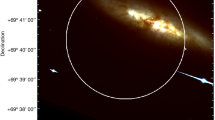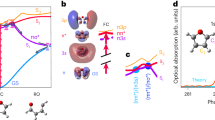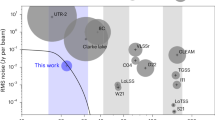Abstract
SEVERAL spectroscopic studios have recently been made of the light emitted from gases submitted to an intense shock wave1–3, but little information is available about the emission from air and other permanent gases. The very high temperatures available make the shock tube a convenient device for study of spectra of astrophysical interest, and a knowledge of the spectrum of air is necessary in any consideration of its high-temperature emissivity which may be required for problems of supersonic flight at high altitude. We have studied emission from air, nitrogen, oxygen, carbon monoxide and carbon dioxide or mixtures of these with argon.
This is a preview of subscription content, access via your institution
Access options
Subscribe to this journal
Receive 51 print issues and online access
$199.00 per year
only $3.90 per issue
Buy this article
- Purchase on Springer Link
- Instant access to full article PDF
Prices may be subject to local taxes which are calculated during checkout
Similar content being viewed by others
References
Resler, E. L., Lin, S.-C., and Kantrowitz, A., J. App. Phys., 23, 1390 (1952).
Greene, E. F., J. Amer. Chem. Soc., 76, 2127 (1954).
Fairbairn, A. R., and Gaydon, A. G., Proc. Roy. Soc., A, 239, 464 (1957).
Rose, P. H., Avco Res. Lab. Res. Note, No. 37 (May 1957).
Author information
Authors and Affiliations
Rights and permissions
About this article
Cite this article
CLOUSTON, J., GAYDON, A. Excitation of Molecular Spectra by Shock Waves. Nature 180, 1342–1344 (1957). https://doi.org/10.1038/1801342a0
Issue Date:
DOI: https://doi.org/10.1038/1801342a0
Comments
By submitting a comment you agree to abide by our Terms and Community Guidelines. If you find something abusive or that does not comply with our terms or guidelines please flag it as inappropriate.



